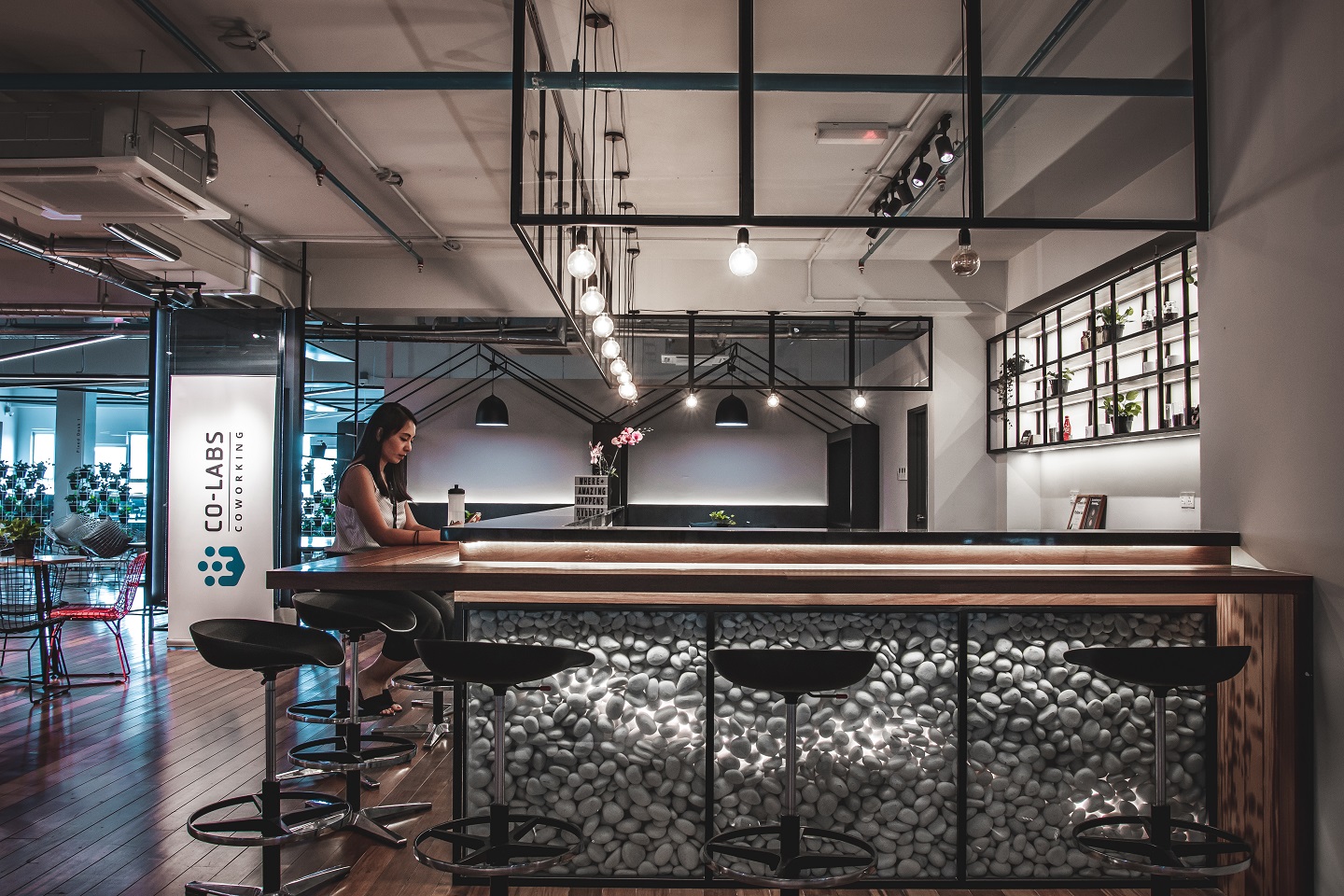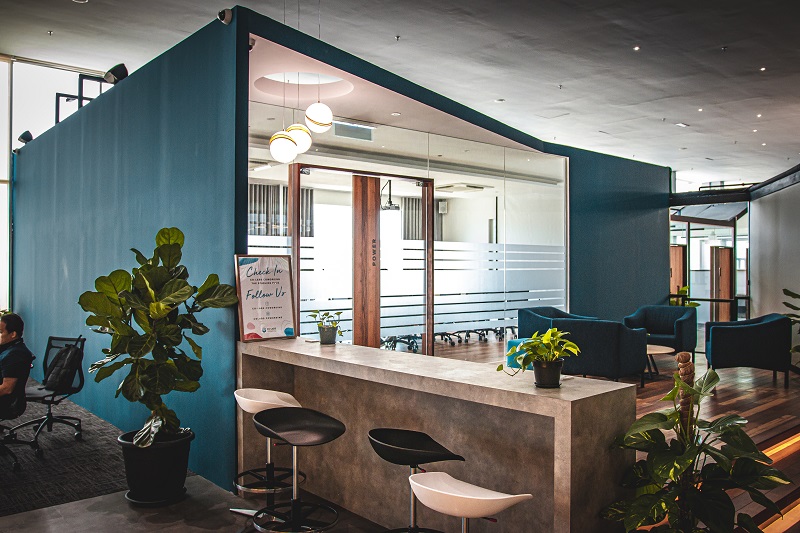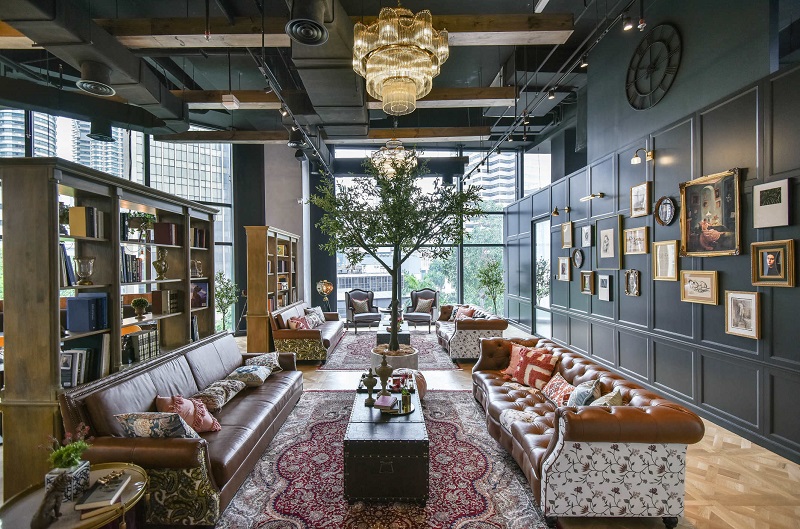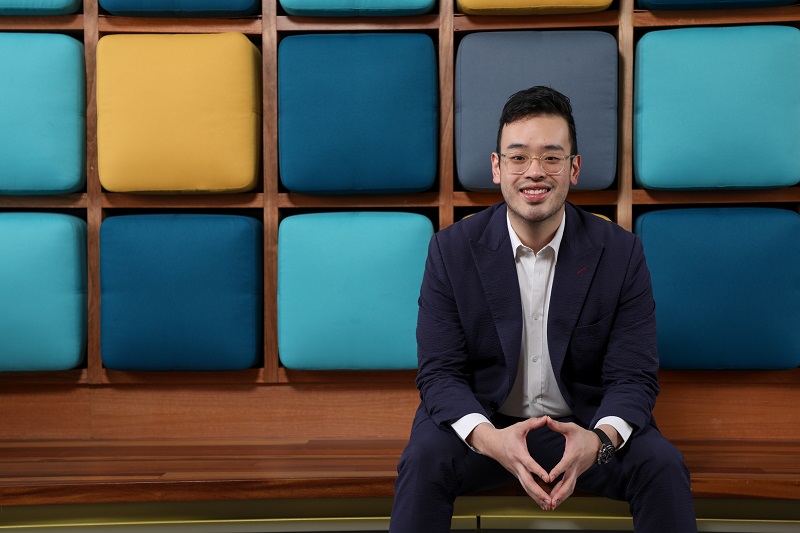
Co-labs Coworking just reopened on May 5, after introducing a 28-day membership freeze (Photo: Co-labs Coworking)
The key to coworking spaces – shared communal settings where individuals work on their own or with other members – may not fit its original model now, with Covid-19 making us wary of words such as community and close contact.
With the lockdown that kept workforces home slowly easing, what are coworking operators doing to draw members to return to their desks and pick up where they left off? How do they ensure a clean, safe and healthy environment so everyone can work without worrying about infection and contagion?
How badly has Covid affected occupancy at coworking spaces? What do people want, or will need, especially after the Conditional Movement Control Order is lifted? Are operators looking at new uses for their spaces?
Benjamin Teo Jong Hian, founder and director of Co-labs Coworking, and Timothy Tiah, founder of Colony, share how they are coping with the challenges posed by the pandemic and plans to better serve members in the new normal.
Benjamin Teo of Co-labs Coworking
Locations in Sekitar26 Enterprise, Shah Alam, Selangor; The Starling in Damansara Uptown and The Starling Plus at Uptown 7, both in Petaling Jaya, and Naza Tower, Platinum Park, KL.
The MCO was an unsettling time for us as we had to temporarily close operations with no certainty as to when we could reopen. But even as we looked for ways to cushion our financial losses, we introduced a 28-day membership freeze throughout the lockdown to help ease the financial burden of our members. I believe this was the right thing to do as a fair and responsible landlord.
We reopened on May 5 and are cautiously optimistic we can get back on track, albeit progressively. Above all, we need to adapt and maintain a positive mindset to survive and thrive.
Currently, we are offering a stimulus package aimed at helping our members, especially those experiencing tighter cash flow, to continue operating their businesses for the long term. It includes a deferred payment scheme on rent, as we believe a reduction will only result in a price war between coworking operators, which will result in negative margins and affect operational sustainability in the long run.
We are focused on reinventing ourselves by rolling out our Business Continuity Plan (BCP) package, which offers a remote workspace solution for enterprises that seek alternate workspaces to accommodate split-team operations.
We are also focusing on KANVAS by Co-labs Coworking, an upcoming enterprise solution that focuses on a complete design-and-build service for corporates seeking customised solutions for flexible workspaces.
In terms of health and safety procedures, we have implemented measures such as space sanitisation, mandatory member and visitor temperature checks, daily screening, more frequent daily cleaning and reduced seating capacity to accommodate social distancing. We have temporarily closed common shared facilities, such as the nap pod.
We are reviewing floor layouts for our future spaces, such as increasing the ratio of our premium office suites (private offices) within the workspace and offering a larger suite area. We also are building larger autonomous anchor tenant areas, which can be designed and built according to ongoing business needs and demands.
img_7984.jpg

For shared workspaces, we are looking at additional fit-outs like dividers, reduced seating capacity and alternate seating arrangements that ensure a safe distance between members and for privacy.
Call me an optimist, but I believe the coworking industry will emerge from the Covid crisis stronger and more important and necessary.
Firstly, I believe there will be higher corporate demand for remote workspaces because large corporations will be looking to decentralise and ‘de-densify’ their offices to accommodate split operations (where employees are divided into different teams) and rotating shift schedules.
To adapt to the shift in market demand, we have adjusted our floor plans to accommodate safe distancing measures and new seating arrangements. For corporates looking to customise their workspace in accordance with their BCP, our enterprise solutions package offers larger, customised workspaces. We are also going ahead with plans to open an additional space later this year.
Secondly, coworking spaces offer crucial support to small businesses, sole proprietors, the self-employed and other entrepreneurs. For those already facing significant barriers in accessing capital or local business networks, simply working from home will not serve their needs. In addition, unlike traditional leases, coworking leases are flexible and offer different types of membership to suit every budget and business need.
Finally, coworking spaces offer networking opportunities between like-minded individuals, which creates business synergy between members. Here is where Co-labs Coworking’s community focus serves us well.
During the MCO, we shifted online and held virtual events that were well-received by our digital audience and community. We expect this will be the situation for a while and have made significant investments to improve our technology to go digital. This includes rolling out an online members portal in the second half of this year, where they can connect with each other, make room bookings, receive alerts and be informed about upcoming events.
We are also looking towards contactless payment options and will be rolling that out under our tech project this year. As our community is important to us, we will continue to help members enjoy a seamless digital experience, build new networks and support one another remotely.
Timothy Tiah of Colony
Locations in Vipod Business Centre, KL; KL Eco City, Q-Sentral, KL Sentral; Star Boulevard KLCC and Kym Tower, Mutiara Damansara, PJ.
So far occupancy has been fairly stable at our locations but it might be affected in the coming months because our business depends on [having] some short-term clients. Under the MCO we were not able to tour new clients to replace those on short-term [leases] when their contracts expire.
Before the MCO, we put together Covid-19 response plans, such as having temperature checks, hand sanitisers and masks for our guests.
We opened when the CMCO came into play. Not all our guests are back at work yet, so our centres are quieter than usual.
Working from home is something we will see in the short- to medium-term. Personally, I find it hard for teams to work effectively when they are working remotely over long periods of time. We are still human after all. We work better with people we build bonds and relationships with – things you cannot do as effectively over a conference call.
I think in the medium to long term, people will come back to the office. I could be wrong about this, and if I am there will be significant repercussions not just for coworking but office real estate as a 'whole in the long term.
colony-coworking-space-star-boulevard-klcc-library.jpg.jpg

I see Colony serving members in a couple of ways after Covid eases. We’re seeing a number of new leads coming from companies that have traditional office spaces and they’re looking to move into more flexible workspaces.
During uncertain times, people shy away from three-year leases and prefer [to sign for] one, three or even six months. This is where Colony comes in. This part is encouraging, but it is too early to tell how many of them we’ll close and how big a positive impact that will have on our business, if any.
The second thing we are seeing is companies may look at how they can do social distancing at the workplace. Colony is built in a way that could cater to this. We don’t have many open coworking desks. Most of our inventory is in private offices. So, people can be [placed] in two-, three- or four-person offices rather than having everyone in one big open space. That would mitigate risk, just like what restaurants are doing right now.




